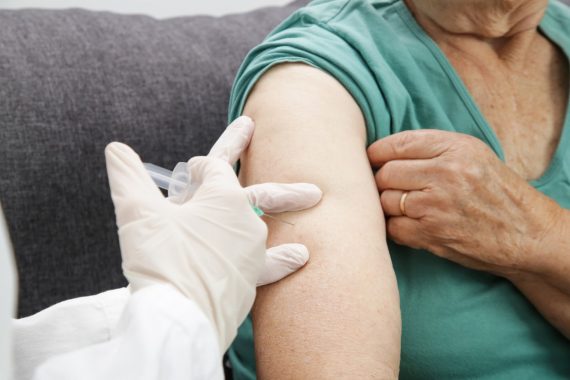Residents in care homes, over-65s and those in a clinical risk group will be eligible for a Covid-19 booster jab this autumn.
This is an amendment to last year’s autumn campaign, when everyone over the age of 50 was eligible for a booster.
The Joint Committee on Vaccination and Immunisation (JCVI) has made its recommendation ahead of the third autumn booster programme and advised completion by early December.
It has been accepted in full by the Government.
Those eligible for the Covid-19 booster vaccine this autumn are:
- residents in a care home for older adults
- all adults aged 65 years and over
- persons aged 6 months to 64 years in a clinical risk group
- frontline health and social care workers
- persons aged 12 to 64 years who are household contacts of people with immunosuppression
- persons aged 16 to 64 years who are carers and staff working in care homes for older adults
The committee has also advised that eligible patients who have not yet had any Covid-19 vaccines should receive a single dose as their primary course.
The target completion date of early December aims to maximise the benefits of the programme ahead of winter since protection is highest in the first three months following vaccination.
The Government has said that further advice on the choice of vaccine products this autumn will follow in due course.
UK Health Security Agency (UKHSA) director of public health programmes Dr Mary Ramsay said: ‘The Covid-19 virus has not gone away and we expect to see it circulating more widely over the winter months with the numbers of people getting ill increasing.
‘The booster is being offered to those at higher risk of severe illness and by taking up the booster vaccine this autumn, you will increase your protection ahead of winter, when respiratory viruses are typically at their peak.’
Health and social care secretary, Steve Barclay, said: ‘I have now accepted the advice from the Joint Committee on Vaccination and Immunisation on eligibility for the 2023 autumn booster programme, to protect those most vulnerable from Covid.
‘NHS England will confirm details on how and when eligible people can access the autumn booster vaccine shortly, and I would urge anyone invited – including those yet to have their first jab – to come forward as soon as possible.’
But it comes as the BMA last week issued a patient safety warning over the Government’s decision to cut the fee GPs are paid per Covid vaccination by 25%.
NHS England has published the new enhanced service specification for Covid vaccines to be delivered between 1 September and 31 March next year, setting out that GPs will be paid £7.54 for each vaccine administered – down from £10.06 – and continue to be paid £10 for each housebound patient.
In March, the Government confirmed that people will no longer be able to get a first or second dose of the Covid-19 vaccine from July if they do not meet JCVI-recommended eligibility.
The spring booster campaign saw Covid vaccinations offered to those aged 75 and over, residents in care homes, and immunosuppressed patients aged five and over.
Pulse October survey
Take our July 2025 survey to potentially win £1.000 worth of tokens














Can see little sense in devoting anything but minimal time to giving more doses of most types of Covid 19, when it is in practical terms a very lacklustre and expensive item. Surely there are other far greater areas of need, with far more effective prevention, control or treatment methods already known. Why spend massive amounts of money on vaccines that don’t work very well ?